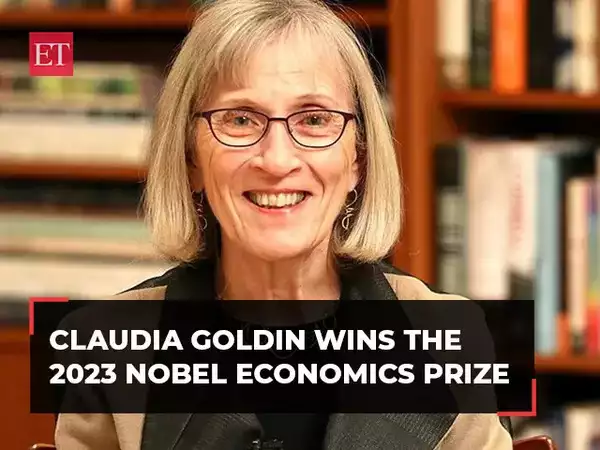Description

Copyright infringement not intended
Picture Courtesy: economictimes
Context: Claudia Goldi won the Nobel Prize in Economic Sciences in 2023 for her research on the workplace gender gap is a significant milestone in the field of economics and gender studies.
Details
- The Nobel Prize in Economic Sciences was created in 1968 and is formally known as the Bank of Sweden Prize in Economic Sciences in Memory of Alfred Nobel. It is awarded alongside other Nobel Prizes in various categories, such as Physics, Chemistry, Medicine, Literature, and Peace.
- The 2023 Nobel Prize in Economic Sciences was awarded to U.S. economist Claudia Goldin for her research on the workplace gender gap.
Key Highlights
- Recognition of Gender Economics: Claudia Goldin's Nobel Prize highlights the increasing recognition of gender economics as a critical field of study. This field focuses on understanding the economic implications of gender disparities and the factors that contribute to them.
- Complex Nature of Gender Inequality: Goldin's research reveals the complexity of gender inequality in the labour market. By showing the U-shaped curve of female labour force participation and the persistent gender wage gap, she underscores that gender disparities are not static but evolves over time.
- Historical Context: Goldin's workplace gender inequality in a historical context, demonstrates that women's participation in the labour force has not followed a straightforward path. This historical perspective is essential for understanding the roots of contemporary gender disparities.
- Factors Affecting Gender Wage Gap: Goldin's research identifies various factors that have contributed to narrowing the gender wage gap, including technological advancements, increased access to education for women, and shifts in societal norms. Understanding these factors is crucial for addressing wage inequality.
- Remaining Challenges: While progress has been made, Goldin's work also highlights persistent challenges, such as occupational segregation and the lack of affordable childcare. These challenges need to be addressed to achieve true gender equality in the workplace.
- Policy Implications: Goldin's research provides valuable insights for policymakers and employers seeking to create more equitable workplaces. It informs the development of policies and practices that can help bridge the gender gap in wages and opportunities.
- Global Relevance: Gender inequality in the workplace is not limited to one country; it is a global issue. Goldin's research has implications beyond the United States, as gender disparities exist worldwide. Her work contributes to the international dialogue on gender economics.
.jpg)
Conclusion
- The Nobel Prize is one of the highest honours in academia and serves as a platform to raise awareness about critical issues. By awarding the Nobel Prize in Economic Sciences to Claudia Goldin, the importance of addressing gender inequality in economics is brought to the forefront.
Must Read Articles:
GENDER GAP: https://www.iasgyan.in/daily-current-affairs/gender-gap
GLOBAL GENDER INDEX: https://www.iasgyan.in/daily-current-affairs/global-gender-index
|
PRACTICE QUESTION
Q. What are some key factors contributing to the gender gap in the workplace, and what strategies can be implemented to address and reduce this gap?
|
















